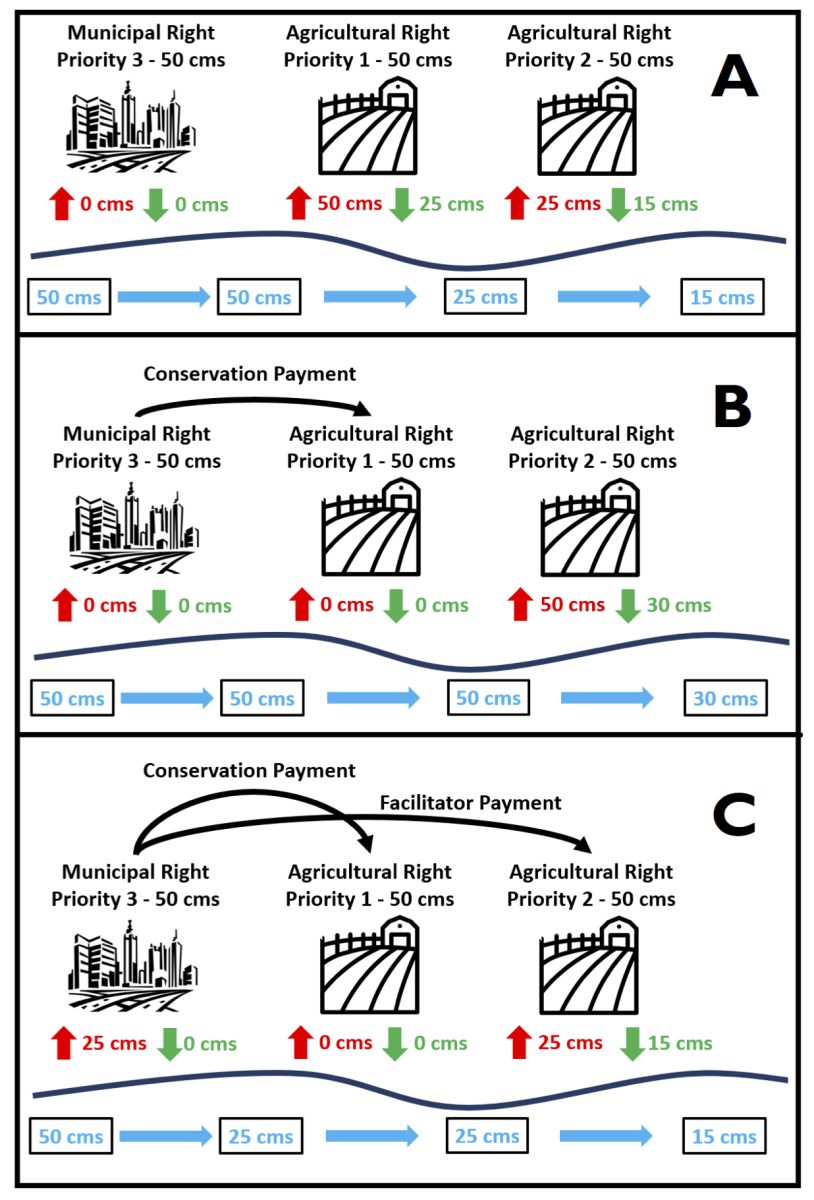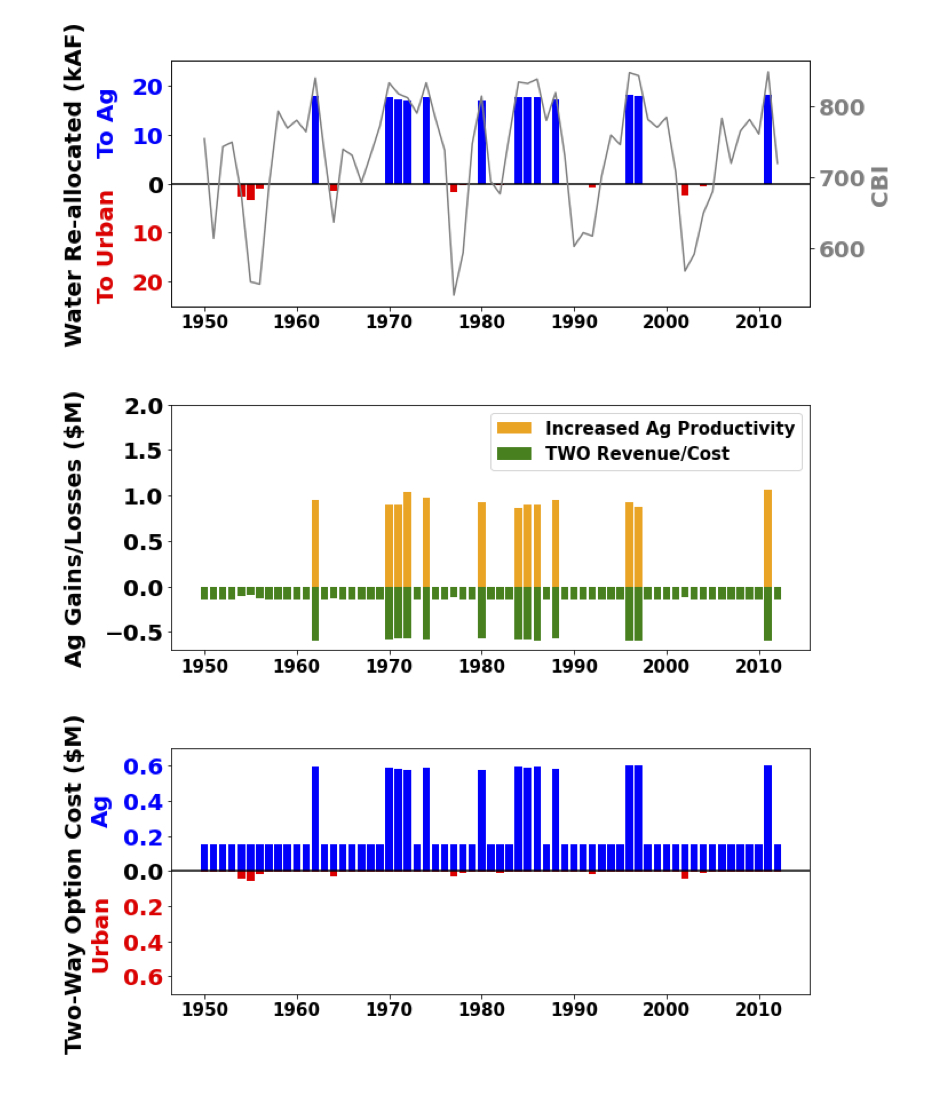Center on Financial Risk in Environmental Systems: Colorado River Basin
Colorado River Basin
Project 1 Title:
Using financial contracts to facilitate informal leases within a Western United States water market based on prior appropriation
Summary:
Transaction costs related to regulatory approval are a significant impediment to water market leases in the Western United States that would greatly reduce the financial impacts of drought. Informal leases facilitated by financial contracts enable rapid short-term water reallocation during drought while reducing transaction costs. The State of Colorado could have accrued up to $222 million in benefits using informal leases.

A simple schematic of water reallocation via informal leases, including: (A) a junior, municipal right being ‘shorted’ by a downstream agricultural user with a more senior right. The junior municipal user can (B) pay the senior agricultural right holder to leave the water instream, but the additional flows created can be diverted by another agricultural right, further downstream, with more seniority than the municipal right. In response, the municipal right can (C) pay this second agricultural right holder to ‘facilitate’ the informal lease by maintaining their level of diversions after the additional water is created, allowing the municipal right holder to divert.
Description:
The ability to reallocate water to higher-value uses during drought is an increasingly important‘soft-path’ tool for managing water resources in an uncertain future. In most of the Western United States, state-level water market institutions that enable reallocation also impose substantial transaction costs on market participants related to regulatory approval and litigation. These transaction costs can be prohibitive for many participants in terms of both costs and lengthy approval periods, limiting transfers and reducing allocation efficiency, particularly during drought crises periods. This manuscript describes a mechanism to reduce transaction costs by adapting an existing form of informal leases to facilitate quicker and less expensive transfers among market participants. Instead of navigating the formal approval process to lease a water right, informal leases are financial contracts for conservation that enable more junior holders of existing rights to divert water during drought, thereby allowing the formal transfer approval process to be bypassed. The informal leasing approach is tested in the Upper Colorado River Basin (UCRB), where drought and institutional barriers to transfers lead to frequent shortages for urban rights holders along Colorado’s Front Range. Informal leases are facilitated via option contracts that include adaptive triggers and that define volumes of additional, compensatory, releases designed to mitigate impacts to instream flows and third parties. Results suggest that more rapid reallocation of water via informal leases could have resulted in up to $222 million in additional benefits for urban rights holders during the historical period 1950 – 2013.
Related Publications:
[superscripts denoting graduate students (M = masters; D = doctoral) and Post-doctoral Researchers (P) or Researchers (R)) working in CoFiRES]
Zeff, H. B.R, Hadjimichael, A., Reed, P. M. and G. W. Characklis, “Using financial contracts to facilitate informal leases within a Western United States water market based on prior appropriation,” Earth’s Future (in review)
Project 2 Title:
Two-way option contracts for facilitating water re-allocation during drought
Summary:
Water markets in the Western U.S. have the ability to reallocate water temporarily during drought, often as short-term water rights leases from lower-value irrigation to higher-value urban uses. Regulatory approval of these transfers, however, is typically lengthy and involves high transaction costs that arise from expensive technical and legal analyses, discouraging leasing. This leads to less efficient allocation, particularly as municipalities often react by purchasing large volumes of permanent rights which are used only to maintain supply reliability during drought. Thus, less water is available to irrigators in wet/normal years, and municipalities pay for large volumes of infrequently used. This research develops a two-way option (TWO) contract that pairs leasing from irrigators to municipalities in dry years with leases from municipalities to irrigators during wet periods. Results suggest that the TWO could maintain urban water supply reliability at a lower cost while allowing irrigators to achieve higher agricultural productivity.

Performance of the Two Way Option (TWO) in terms of both water reallocation (top panel) and financial implications (middle/bottom panels) for both urban and agricultural users. Note that the TWO is triggered, and the direction of water reallocation is determined, by a water scarcity index (CBI, top panel).
Description:
Lengthy regulatory approval periods and the high costs of related legal and technical analyses discourage water rights leasing, leading municipalities to purchase and maintain volumes of permanent water rights, typically from agriculture, well in excess of that required to meet average demand so as to ensure supply reliability in dry years. This results in less agricultural productivity, as water rights are sold by irrigators and rarely leased back to them by urban users who are likewise deterred by the high transaction costs associated with leasing. This results in less water being available to agriculture in wet and normal hydrologic years, and urban users paying for large volumes of permanent water rights that are used in only the driest years. The state of Colorado has recognized this issue and has passed legislation to allow for long-term multi-year leasing contracts that only need regulatory approval once, thus reducing transaction costs significantly. Nonetheless, relatively little research has been done to investigate the design of multi-year contracts or to evaluate their performance. This research develops a multi-year two-way option (TWO) contract that pairs leasing from irrigators to urban users in drought with leases from urban users to irrigators during wet periods, with the option triggered by a water availability index. The modeling framework developed to assess TWO performance includes consideration of the hydrologic, engineered, and institutional systems governing the South Platte River Basin in Colorado where increased competition for water between municipalities (e.g., Boulder), and irrigators has been observed in recent years. The framework is built around StateMod, a network-based water allocation model used by state regulators to evaluate water rights allocations and potential rights transfers. Several different scenarios related to rights holdings and lease pricing are examined. In all cases, results suggest that the TWO could allow for reduced municipal rights holdings and costs while still maintaining urban water supply reliability, at the same time providing irrigators with increased agricultural productivity in wet years, and the ability to generate additional revenues via option payments from municipalities in dry years.
Collaborators:
Dr. Patrick Reed, Cornell
Dr. Antonia Hadjimichael, Pennsylvania State University
Related Publications:
[superscripts denoting graduate students (M = masters; D = doctoral) and Post-doctoral Researchers (P) or Researchers (R)) working in CoFiRES]
Hirsch, Z. M.M, Zeff, H. B.R, and G. W. Characklis, “Two-way option contracts for facilitating water re-allocation during drought” (in prep)
Funding Support:
Pacific Northwest National Laboratory
Integrated Multi-scale Multi-sector Modeling Progam (IM3)
U.S. Department of Energy, Office of Science
